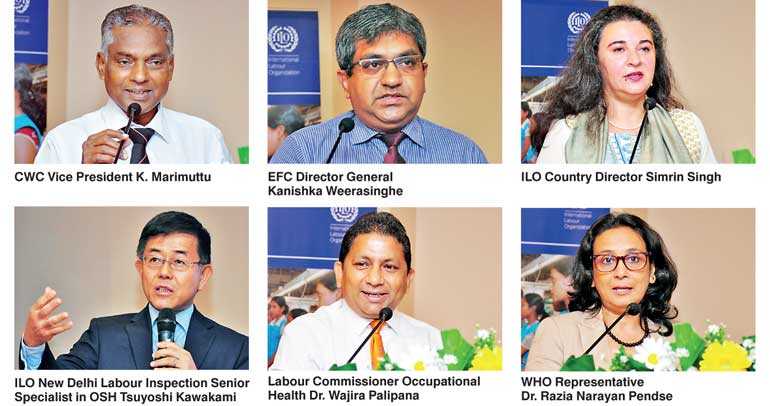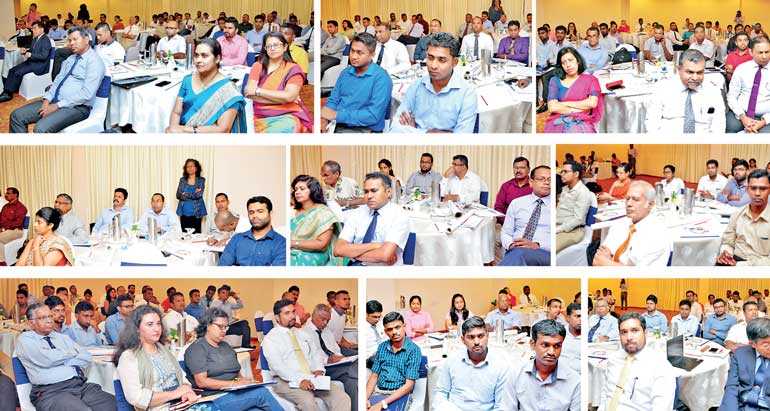Wednesday Feb 25, 2026
Wednesday Feb 25, 2026
Tuesday, 1 May 2018 00:00 - - {{hitsCtrl.values.hits}}


By Shannon Jayawardena
Sri Lanka has to live up to its global commitment in improving safety and health of youth employees, stressed the National Seminar on Occupational Safety and Health organised recently in commemoration of the World Day for Safety and Health at work.
The event was organised by the International Labour Organisation (ILO) in collaboration with the Ministry of Labour and Trade Union Relations, National Institute for Occupational Safety & Health (NIOSH) together with several employers and workers.
According to ILO’s latest statistics, 2.78 million workers die every year due to occupational accidents out of which, young workers have significantly higher rates of injury. European data show that the incidence of non-fatal injury at work was more than 40% higher among young workers between the ages of 18 and 24.
ILO Sri Lanka and Maldives Country Officer Simrin Singh said: “This is a very important issue faced by many across the world and those here in Sri Lanka. It’s a very sobering time for us now because as many of you have being reading in the press, lately some of the most extreme forms of occupational safety and health are distressed in Sri Lanka which has been noted by the incident of the death of five youth employees. It’s not just this month, but has been happening for years now and immediate action is needed on this front.”
She stated that education about work hazards is very important for both formal and informal sectors as well as for family businesses. Sri Lanka is making significant investments in improving youth employability but has to take a more holistic approach.
Ceylon Workers Congress Vice President K. Marimuttu noted: “Serious accidents do happen in workplaces and the workers are at a loss as to why it happens. This campaign thereby is to achieve the goal of getting rid of child labour by 2025.”
Young workers are more at risk because of their inheritance of age. Physical stages of development and psychological stages of development are its key challenges. Likewise they are also influenced by their age at work experiences and at and educational level.
Employer’s Federation of Ceylon Director General Kanishka Weerasinghe said: “Much needs to be done and our policy is to implement Occupational Safety and Health (OSH) standards across the country. Our message has always been that prevention is better than cure. We have also called for the creation of a task force that would immediately mobilise such situations. There needs to be a holistic effort from the grass roots level itself.”
Weerasinghe emphasised on the fact that the world is changing and employment is changing. The big economy however is here to stay. In terms of OSH you cannot compromise. Children in child labour must be withdrawn from all forms of work for which they have not reached the minimum age and ensured access to quality education.
The campaign will be focusing prioritising hazardous child labour as part of an integrated approach to eradicating all child labour. More attention needs to be paid to the youngest children between 5-11 years for whom progress has stalled and among whom hazardous work has increased since 2012.
WHO Representative Razia Narayan Pendse said: “Health is equivalent to productivity and it is important to ensure that our workplace is productive. If you look at most of these accidents within the workplaces, most of them are preventable and if it is preventable why let it happen? Empower the workers with the knowledge and skills to protect themselves.”
She stressed upon the fact that health and employment go hand in hand hence regular check-ups are very important. Eliminating hazardous child labour and improving the safety and health of young workers will make it possible for the next generation to start their working lives as productive, fairly-remunerated workers capable of contributing to social justice and economic growth.
All young workers should in any case, be protected by an integrated strategy that promotes a culture of prevention for their benefit and should seek to identify and eliminate occupational safety and health hazards. In either case, the child has the right to complete basic education and receive vocational education and training.
Ministry of Labour and Trade Union Relations Commissioner General of Labour Representative W.M. Palipana noted: “Every worker who goes to work must return home alive and safely. Every 15 minutes a worker dies around the world due to work related accidents which should be prevented.”
Pix by Lasantha Kumara